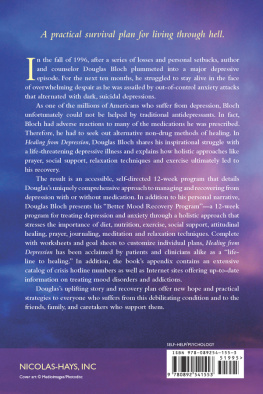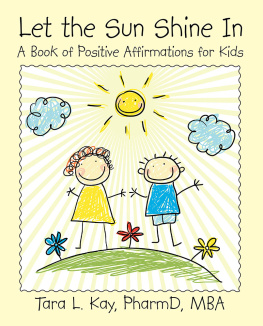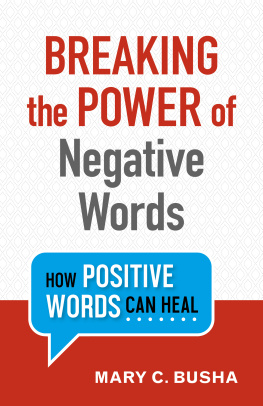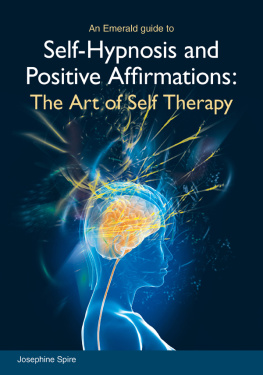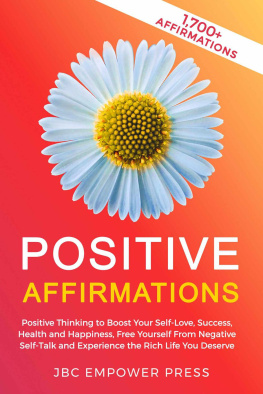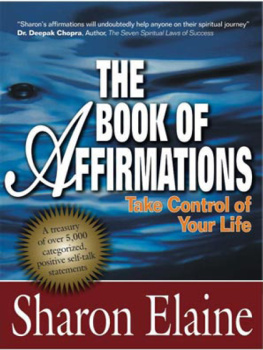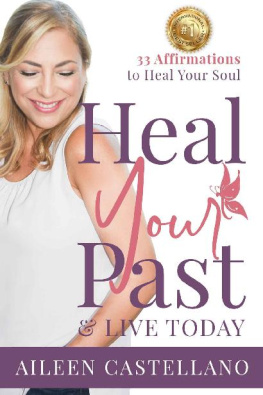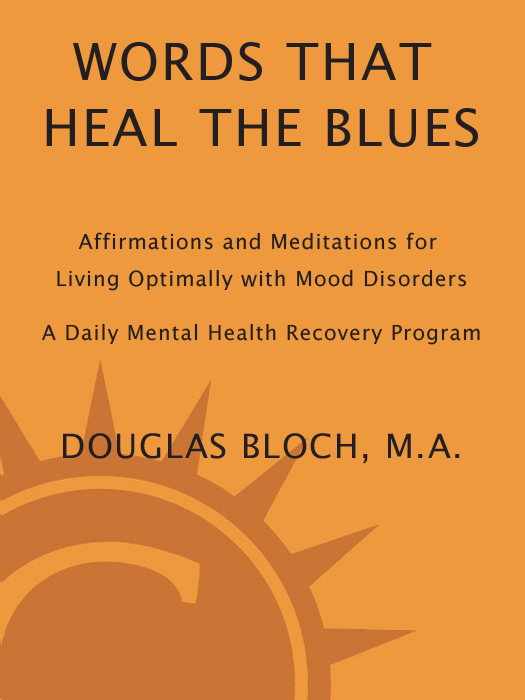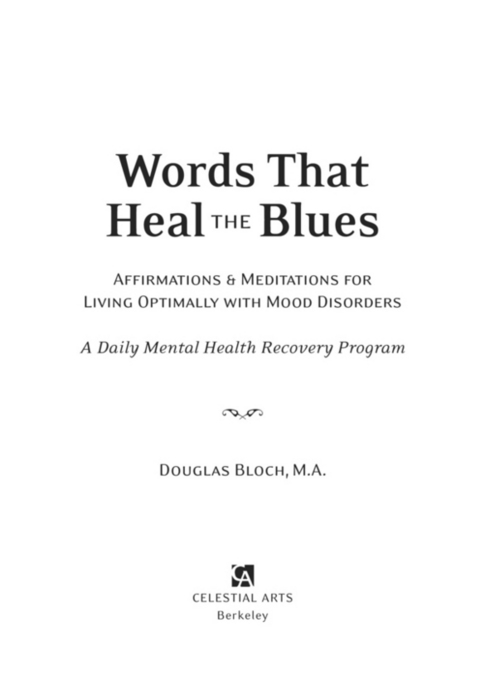Other Inspirational Books by Douglas Bloch
Words That Heal: Affirmations and Meditations for Daily Living
Listening to Your Inner Voice: Discover the Truth Within You and Let It Guide Your Way
I Am With You Always: A Treasury of Inspirational Quotations, Poems, and Prayers
The Power of Positive Talk: Words to Help Every Child Succeed
Healing from Depression: 12 Weeks to a Better Mood
Copyright 2004 by Douglas Bloch
All rights reserved. Published in the United States by Celestial Arts, an imprint of the Crown Publishing Group, a division of Random House, Inc., New York. www.crownpublishing.com
www.tenspeed.com
Celestial Arts and the Celestial Arts colophon are registered trademarks of Random House, Inc.
Library of Congress Cataloging-in-Publication Data
Bloch, Douglas, 1949
Words that heal the blues : affirmations & meditations for living optimally with
mood disorders : a daily mental health recovery program / Douglas Bloch.
p. cm.
1. Affective disorders. 2. Affective disordersTreatment. 3. Affirmations.
I. Title.
RC537.B5355 2004
616.8527dc22
2003022476
eISBN: 978-0-307-81586-6
v3.1
Blessed are those who confess their pain and brokenness, for they shall take hold of their healing. Blessed are those who wrestle with their own darkness, for they shall touch again the light from which they came.
Rodney Romney, Wilderness Spirituality
Dedication
To all who feel or have felt helpless in the face of mental illness. May they feel empowered to help themselves, and may they know they are not alone.
Contents
Acknowledgments

I would like to begin by thanking Jo Ann Deck and the staff at Celestial Arts for their support in bringing vital information about the treatment of depression to the general public. That support began with the publication of Healing from Depression: 12 Weeks to a Better Mood in 2002 and continues with the publishing of this work, Words That Heal the Blues.
My first collection of affirmations, Words That Heal, which was originally published in 1988, inspired Words That Heal the Blues. I would like to thank its readers for making the book a well-loved classic on affirmations.
I also want to thank the brave and courageous souls who attended my anxiety and depression support groups over the past three years. The healing they experienced is testimony to the effectiveness of the holistic treatment for depression that I outline in Healing from Depression and Words That Heal the Blues.
I also express appreciation to my partner, Joan, for helping me run these groups.
Finally, I would like to thank my Portland editor, Joan Bridgman. Her comments and suggestionsespecially in the formation of the affirmationshelped simplify the book and make it a more potent vehicle for healing and transformation.
Who This Book Is For

50% of all Americans will experience a mental or emotional disorder sometime during their lives.
The U.S. Surgeon General,
The State of the Nations Mental Health, 1999
As with my previous book Healing from Depression, Words That Heal the Blues grew out of my personal experience as a depression survivor as well as my clinical work in facilitating depression and anxiety support groups. Although the affirmations and meditations in this book target those who suffer from depressive illnesses, I find that virtually anyone who struggles with a mental or emotional disorder can use them. This includes a great many people. According to the surgeon general in the 1999 publication The State of the Nations Mental Health, 22 percent of all Americans suffer a mental or emotional disorder in any given year, and half of all Americans are afflicted over the course of a lifetime.
In the report the surgeon general defined mental disorders as health conditions marked by alterations in thinking, mood or behavior that cause distress or impair a persons ability to function. These conditions include the following:
depression
bipolar disorder
generalized anxiety disorder
panic attacks
PTSD (post-traumatic stress disorder)
attention deficit disorder
alcoholism
drug addiction
eating disorders
phobias
schizophrenia
Moreover, the self-care strategies outlined in the daily lessons can help you deal with the following situational stressors:
health problems
work or financial crises
grief over the loss of a loved one
the ending or beginning of relationships periods of transition
Thus, whether you suffer from a mental/emotional disorder or face a difficult challenge, the practical coping strategies outlined in this book can make a positive difference in your life. I wish you the best on your healing journey.
Introduction: How to Use This Book

May all sentient beings have happiness and its causes.
May all sentient beings be free from suffering and its causes.
May all sentient beings not be separated from sorrowless bliss.
May all sentient beings abide in equanimity, free from bias, attachment and anger.
Tibetan Buddhist prayer for the alleviation of suffering
Words That Heal the Blues is a collection of affirmations and meditations designed to help you live optimally, balance your mood, and alleviate the symptoms of anxiety, depression, and other mood disorders. The book is structured around a series of daily lessons, each of which contains the following:
1. A daily meditation
2. A series of affirmations focusing on the days topicpositive thoughts and ideas
3. A quotation that encapsulates the essence of the days lesson
4. A self-care activity for the day
The basic way to use this book is to read one lesson a day, so that you cycle through the material approximately once a month, or every thirty days (specific ways to do this are provided on meditations and affirmations will become etched into your brain and nervous system, creating new circuits and pathways.
You can also use this book as a source of mental first aid. If you begin to feel distressed by negative thoughts or feelings, look through the contents and locate a daily lesson that speaks to your condition. Read over the lesson, using it as a source of comfort, guidance, and support. You may also turn to a daily lesson simply because you are inspired to do so. No specific formula exists for using this book. Let yourself be guided to the words that touch your heart.
In addition, feel free to share the material in this book with friends or family members who might seek comfort or inspiration. Anyone who seeks to bring greater wellness and harmony into his or her life can use the affirmations and meditations.


